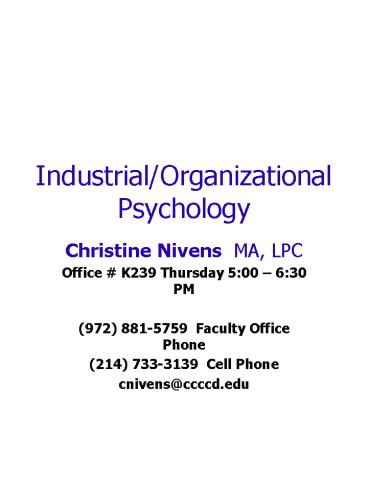IndustrialOrganizational Psychology - PowerPoint PPT Presentation
1 / 11
Title:
IndustrialOrganizational Psychology
Description:
Lillian Gilbreth was known for her time and motion studies. Chapter 1: ... Employee recruitment and retention, along with the study of future HR needs ... – PowerPoint PPT presentation
Number of Views:106
Avg rating:3.0/5.0
Title: IndustrialOrganizational Psychology
1
Industrial/Organizational Psychology
- Christine Nivens MA, LPC
- Office K239 Thursday 500 630 PM
- (972) 881-5759 Faculty Office Phone
- (214) 733-3139 Cell Phone
- cnivens_at_ccccd.edu
2
Chapter 1 An Introduction into I/O Psychology
- Definition of I/O Psychology
- Three major specialty areas of I/O psychology and
their focal points - Contributions of the following people
- Walter Dill Scott
- Hugo Munsterberg
- Walter Bingham
- Frederick Taylor (early 1900s)
- Robert Yerkes (World War I)
- Hawthorne Studies (1920s)
- James Cattell, Lillian Gilbreth, and Marion Bills
(1930s) - World War II
- 1960s 1980s
- Current trends in I/O psychology
- Seven critical forces likely to affect the future
of I/O psychology - Requirements for becoming and I/O psychologist
3
Chapter 1 Definition of I/O Psychology
- Definition of I/O Psychology
- Psychology is the scientific of behavior and
mental processes. - Industrial/Organizational Psychology refers to
the application of psychological theory and
methodology to the problems of organizations and
the problems of groups and individuals in
organizational settings. - These psychologists work in background
- Employment tests, career training, design of job
tasks, preparation for retirement - They must used systematic and exacting research
methods
4
Chapter 1 Three major specialty areas
- Personnel Psychology
- Deals with employee recruitment and selection,
training and development, performance appraisals,
and job analysis - Often work in Human Resources
- Organizational Psychology
- Focus is on group influences on individual
employees - Deal with the structure of organization,
communication patterns, effects of diversity,
etc. - Human Factors or Engineering Psychology
- Deals with interaction between people and
machines - Equipment design and safety programs
5
Chapter 1 Development of I/O Psychology
- Wilhelm Wundt 1879 in Germany developed the
first psychological laboratory - Began in US in 1892 with the founding of the
American Psychological Association (APA) - Cited as founders of I/O psychology
- Walter Dill Scott 1901 application of
psychological principals to advertising, notion
of incentive pay to motivate employees, and
concern with employees attitude - Hugo Munsterberg studied under Wundt and
received a doctorate he was a proponent of
selection testing and development of the first
lie detector or polygraph - Walter V. Bingham started the Division of Applied
Psychology, the first academic program in I/O
psychology and was responsible for his emphasis
on basic research in the early days - Frederic W. Taylor was an engineer who believed
that scientific principles could be applied to
redesign the work environment leading to greater
productivity, benefits to the organization, and
eventually leading to higher wages for employees - Efficiency Experts
- Scientific Management - 1911
6
Chapter 1 Fundamental Principles of Taylors
Scientific Management Theory
- Work methods can be scientifically designed for
efficiency, which results in the One Best
Method for doing a job - The best workers should be selected and trained
in the new One Best Method - There should be a spirit of cooperation between
management and workers - Managers and workers must share responsibility
for the design and conduct of work - Motivation results from monetary gain
7
Chapter 1 Development of I/O Psychology
- World War I April 6th 1917
- Problem of classifying millions of recruits
- Robert M. Yerkes 1916 reviewed hundreds of
intelligence tests - Tests used to identify Officer Material
- Army Alpha Test
- gt 25 of recruits were illiterate
- Army Beta Test
- Used to test if recruits were illiterate
- Rating men in the Army by Walter Dill Scott and
Walter Bingham - After the War vocational tests were developed
to increase efficiency and workers well-being - James Cattell consulting services for fee
- Women held the majority of positions applied
psychology in the early years - Marion Bills was known for wage incentive and job
classification System and a job evaluation system - Lillian Gilbreth was known for her time and
motion studies
8
Chapter 1 Development of I/O Psychology
- Hawthorne Studies Elton Mayo (late 1920s)
- First I/O research study to focus on
understanding employees - Consider employees attitudes, group norms, and
leadership styles - Began Human Relations Movement
- World War II
- Developments in testing, training, and
performance appraisal - Advances in equipment design
- Government Regulations
9
Chapter 1 Development of I/O Psychology
- Current Concerns
- Legal and Social issues such as court rulings,
safety standards, and fair employment - Employee recruitment and retention, along with
the study of future HR needs - Analysis of training needs and evaluation of
training programs - Organizational culture
- Fitness, health, and stress
- Effect of new technology
- Future needs of and challenges faced by
organizations - Internationalization and increasing diversity of
the workplace
10
Chapter 1 Development of I/O Psychology
- Seven Critical Forces
- Increasing diversity in the workforce
- Reintegration of home life and work life
- Globalization multinational organizations and
customer - Expanding human resource planning
- The shift from manufactured base to knowledge
based workforce - Rising employee expectations and the need to
balance the costs and demands of those
expectations - A renewal of corporate social responsibility
11
Chapter 1 Development of I/O Psychology
- Careers in Industrial/Organizational Psychology
- What are they??
- Education and Training Requirements
- Minimum Educational Requirement is usually a
masters degree but varies by state and passing
of a licensing test - I/O psychology has reacted to and been driven by
the needs of society from its beginning leading
to increasing job opportunities - I/O psychology is concerned with more than
efficiency and productivity. Employee health,
stress reduction, and the quality of work life
are becoming increasingly important































